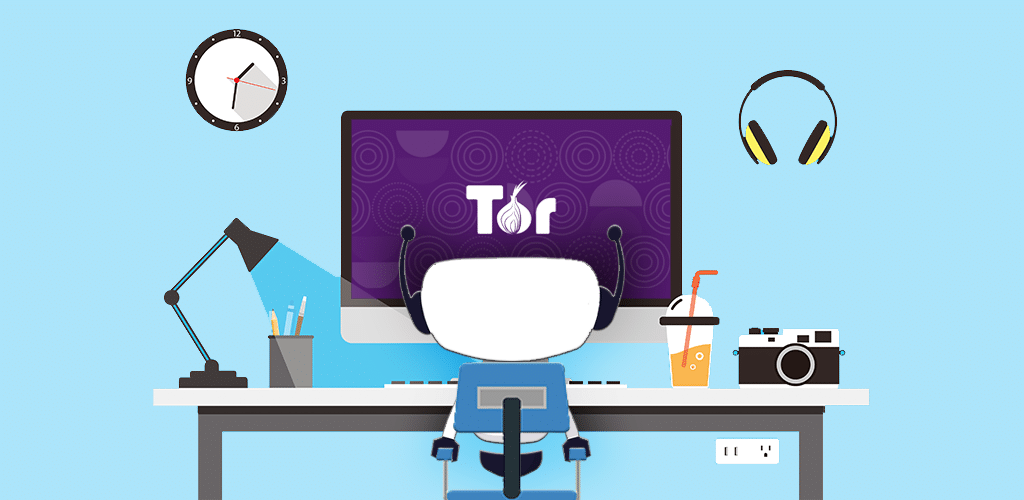October 17, 2019
What is Tor and Why Should I Use it?
Posted by Rhiannon

- How does it work?
- Who should use it?
- What are its pros and cons?
How Does It Work?
This type of technology was designed to create increased anonymity for users who don’t want their online activity to be tracked. Because the project is not-for-profit, it relies on volunteers to remain active. The main way Tor keeps users anonymous is through the use of a large server network scattered around the world. Internet connections through this network are difficult to intercept because they don’t rely on a single organization.
When a user first establishes an internet connection through the network, any requests made are encrypted three different times for the three different stages of your search/request (the entry/guard to your search, the path through which data travels, and the exit of your search). When the request is passed on through the entry, the entry point can see the user’s IP address but not the request. The request is then passed on to the middle layer which funnels it to the exit layer. The exit can see the user’s request but cannot see its originating address.
While individual stages of the request can see certain elements of it, the path of the request cannot be traced altogether.
What is Tor For and Who Should Use It?
Because Tor completely anonymizes a browsing session (instead of merely securing it), the average internet user reading the news and browsing memes probably doesn’t require the advanced level of security this technology provides. In these cases, a VPN or private browsing session is often all a person requires. However, the Tor platform offers a certain level of functionality that benefits all users. So, what, and who, is Tor best for?
- Users Who Don’t Want Their Data Sold or Stolen: When a person accesses the internet, their internet service provider can track and log their activities through the user’s IP address. They can sell that information to marketers, governments, and other third parties. By anonymizing the session, data collection and selling cannot occur. Tor also protects users from identity theft.
- Users Who Want to Communicate Privately: Data breaches are becoming a mainstay in the news. To a hacker, everything from passwords to emails is fair game to be stolen and leaked. People who want to communicate sensitive information online but are concerned that a digital trail could spell out a data leak, using an anonymous network is an excellent solution.
- Researchers: Journalists, scientists, students, and anyone else who needs to carry out extensive research on a subject may want to consider using Tor to conduct that research. Search results in a non-private browser may experience bias and some countries also hide information on certain topics. Anonymized browsing circumvents these issues.
- Users Who Don’t Want to Be Surveilled: A perfectly innocent internet search might raise flags with organizations on the hunt for suspicious activity. With a single word or phrase, an internet user could find that their every online activity is being tracked by these agencies. For those users who are suspicious of surveillance, using an anonymous network can help.
- Users in Countries With Strong Censorship: Many nations around the world censor the content their citizens can access. For people living in those regions, a network like Tor can help get around those restrictions.
What are the Pros and Cons of Tor?
You can now answer the question “what is Tor,” and the question “who should use Tor?” However, before switching to this platform, there are a few pros and cons to its use to be aware of.
- Pro: The technology’s complex encryption guarantees anonymity.
- Con: Because the encryption process is complex, it slows network speeds considerably.
- Pro: The software is completely free, and easy to use.
- Con: Organizations monitoring exit points may intercept message content.
- Pro: Because the network spreads across the world, shutting it down is difficult. Communications are hard to intercept.
- Con: Volunteers run the system. As a result, there is little transparency about who those volunteers are or accountability for their actions.
- Pro: The platform allows users to access geo-blocked content.
- Con: Connecting from a specific country is difficult. Users interested in connecting to the network through an identity from a specific country must either configure their connection or disconnect and reconnect several times before they can connect through the country they require.
- Con: Tor is not available for use on all operating systems.
While Tor is not for everyone, internet users looking for an anonymous browsing experience should give the platform a chance.
To protect yourself further, browse the web privately and safely with HotBot VPN.
]]>Posted by Rhiannon
More Blog Posts
February 14, 2023
How the Investigatory Powers Act Impacts Citizen Privacy
In 2016, the United Kingdom passed the Investigatory Powers Act or IP Act, into law. This act empowered the government and related agencies to access and collect citizen data, without consent. Critics immediately slammed the new law. The media dubbed it the “Snoopers’ Charter.” Meanwhile, Edward Snowden described the act as “the most extreme surveillance […] Read moreFebruary 14, 2023
Review: qBittorrent Torrent Client
If you plan on torrenting files, you need a client with which to do so. There are dozens on the market, some paid, some free. Others are feature-heavy while some have just the basics. A few are recent additions to the market while others have been around nearly as long as torrenting. The qBittorrent torrent […] Read moreFebruary 14, 2023

